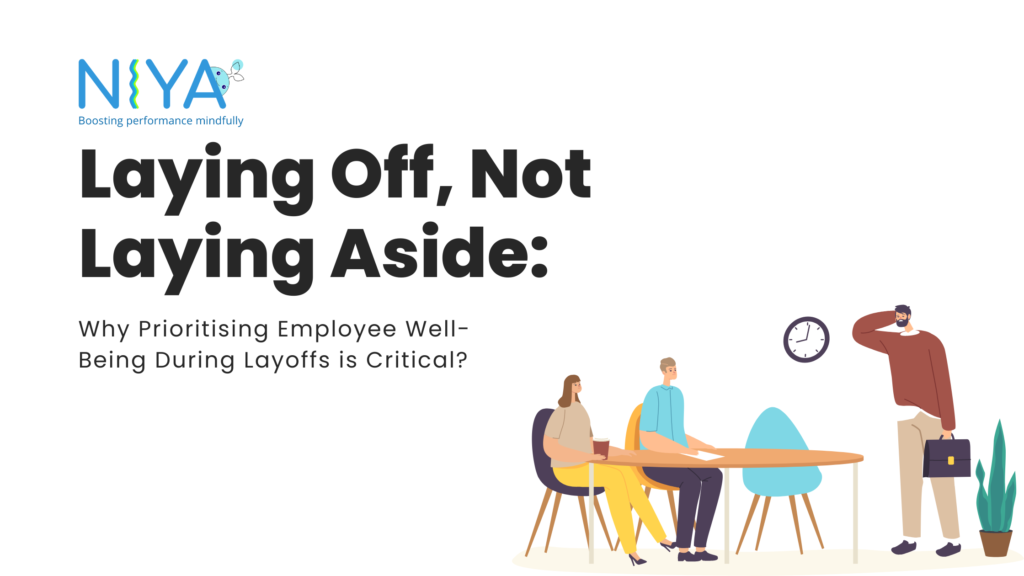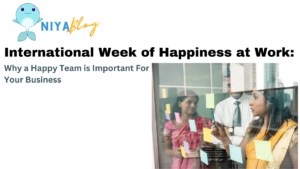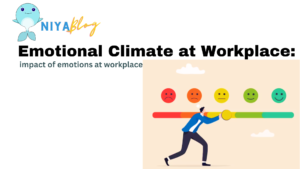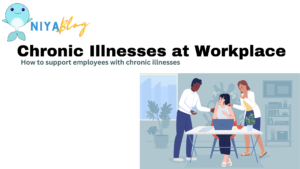
Laying Off is not Laying Aside..
Layoffs are like a hurricane that hits a company unexpectedly, leaving a trail of destruction in its wake. As an employer, it’s easy to get caught up in the logistics and financial implications of the situation, forgetting about the emotional toll it can take on employees.
But just as homeowners prepare for a storm by securing their property and ensuring their safety, companies must prioritise employee well-being during layoffs to weather the storm successfully.
In today’s unpredictable economy, layoffs have become increasingly common. According to a leading digital publication, over 18000 Indian employees were laid off or discharged in 2022 alone. In the face of such staggering statistics, it’s more critical than ever for employers to recognize the importance of prioritising employee well-being during layoffs.
Failing to prioritise employee well-being during layoffs can have significant consequences. Employees who feel undervalued and unsupported during this difficult time are more likely to experience negative emotions such as anxiety, fear, anger and even depression.
These emotions can lead to a:
- Decreased productivity, lower quality work
- Disengagement, Increased absenteeism, and
- High employee turnover rates.
Additionally, layoffs can damage a company’s reputation and make it difficult to attract top talent in the future.
It is important for companies to acknowledge and address these emotions and provide support to employees during these challenging times.Prioritising employee well-being during layoffs can yield significant benefits. By providing support and resources to employees during this challenging time, companies can:
- Boost employee morale
- Instil confidence about future of the company
- Build trust with their workforce
This can lead to a more engaged and motivated workforce, ultimately resulting in increased productivity and improved financial performance.
In this blog post, we’ll explore why prioritising employee well-being during layoffs is critical. We’ll delve into the emotional toll that layoffs can take on employees.
The Emotional Toll of Layoffs

Layoffs can have a significant emotional toll on employees, leaving them feeling uncertain, anxious, and undervalued. This emotional toll can have negative consequences for both the employees and the company they work for.
Let’s take an example.
Just as a hurricane or earthquake can leave people feeling shaken and vulnerable, a layoff can have a similar effect on employees. They may feel like their livelihoods are at risk, and their sense of stability and security is threatened. This can lead to feelings of anxiety, depression, and even PTSD.
According to a survey by the American Psychological Association, job loss is one of the most significant sources of stress in a person’s life. It ranks higher than divorce or the death of a family member. The survey also found that individuals who experience job loss are more likely to experience symptoms of depression and anxiety.
What about the survivors?
While the emotional toll of layoffs on employees who are let go is well documented, it’s important to recognize that those who remain in the company can also be impacted by the experience. Here are some ways that layoffs can take an emotional toll on the ones who survived:
- Survivor guilt: Employees who remain after layoffs may feel guilty that their colleagues were let go while they were spared. They may feel a sense of responsibility for the job loss of their colleagues, or worry about how they will manage the increased workload.
- Fear and anxiety: Layoffs can create a culture of fear and uncertainty in the workplace. Survivors may worry about the stability of their own jobs, or feel anxious about the future of the company. This can lead to stress, burnout, and decreased productivity.
- Decreased morale: Layoffs can have a negative impact on workplace morale, particularly if employees feel that the layoffs were handled poorly or unfairly. Survivors may feel demoralised or disengaged, which can lead to decreased productivity and retention.
- Increased workload: After layoffs, the employees who remain often have to take on additional responsibilities to compensate for the loss of staff. This can lead to increased stress and burnout, as well as decreased job satisfaction.
- Trauma: For some employees, the experience of layoffs can be traumatic. They may experience symptoms of post-traumatic stress disorder, such as anxiety, depression, and flashbacks.
Ready to tackle stress and anxiety head-on? Join our workshop on “Dealing With Layoff Anxiety” and take the first step towards a healthier, happier you!
Email your interest on nidhil@niya.app. We will schedule a workshop for you!
The impact of negative emotions on productivity and company reputation
The emotional toll of layoffs can also have negative consequences for the company.
- Employees who feel undervalued and unsupported during the layoff process are more likely to become disengaged and less productive.
- They may also have negative feelings towards the company and may be less likely to recommend it as an employer to others.
Layoffs can have a significant emotional toll on employees. They can leave employees feeling vulnerable, uncertain, and undervalued.
However, companies that prioritise employee well-being during layoffs can minimise the negative emotional impact on employees and ultimately benefit from a more engaged and productive workforce.
Examples of Successful Employee Well-being Prioritization During Layoffs
During times of layoffs, companies that prioritise employee well-being can demonstrate their commitment to their employees and improve the overall experience for those affected. Here are a few examples of successful employee well-being prioritisation during layoffs:
- Microsoft: When Microsoft announced layoffs in 2014, the company provided affected employees with a comprehensive severance package that included at least 60 days of pay and benefits, outplacement services, and access to career counselling.
Microsoft also encouraged managers to help impacted employees find new roles within the company and created a job placement centre to help connect them with new opportunities outside of Microsoft.
- IBM: In 2020, IBM announced layoffs as part of a restructuring effort. The company offered impacted employees severance packages, extended healthcare benefits, and access to job training and placement services.
IBM also provided additional support for employees who remained with the company, including a special program to help employees manage stress and maintain well-being during the transition.
- LinkedIn: As mentioned earlier, LinkedIn has also prioritised employee well-being during layoffs. In addition to offering generous severance packages and access to job training and placement services,
LinkedIn provided emotional support resources for both impacted employees and those who remained with the company. This included virtual support groups, online wellness resources, and a “resilience coaching” program.
- Salesforce: Salesforce has also demonstrated a commitment to employee well-being during layoffs. In addition to offering severance packages and job placement assistance, the company created a special program to help impacted employees manage their well-being during the transition.
This included access to virtual support groups, online wellness resources, and coaching from employee well-being experts.
- Flipkart: In 2019, Flipkart, one of India’s largest e-commerce companies, announced layoffs due to a reorganisation of the business. The company provided affected employees with generous severance packages, including up to six months’ salary, medical insurance coverage for three months, and job placement assistance.
Flipkart also created a new talent exchange program to help connect impacted employees with job opportunities within the company’s ecosystem of partners and startups.
- Swiggy: In 2020, Swiggy, a food delivery company in India, announced layoffs due to the impact of COVID-19 on the business. The company offered a generous severance package, including four months of salary, health insurance coverage, and access to a support network for job placement assistance.
Swiggy also provided impacted employees with access to an employee assistance program, which offered counselling and support for mental health and well-being.
But did any company help the employees who survived the layoffs?
Many companies recognize that layoffs can have a negative impact on the morale and well-being of surviving employees, and therefore prioritise their well-being during and after the layoff process. Here are a few examples of companies that have taken steps to support the well-being of employees who survived layoffs:
- Cisco: Cisco, a technology company, implemented several initiatives to support the well-being of employees who survived layoffs.
The company provided employees with access to a “career support program,” which included coaching, training, and other resources to help employees navigate career transitions.
Cisco also offered virtual wellness programs, such as yoga classes and mindfulness sessions, to help employees manage stress and maintain well-being.
- Intel: Intel, a semiconductor company, prioritised the well-being of employees who survived a recent layoff by offering a range of benefits and resources.
This included access to a “survivor transition program,” which provided coaching, training, and job placement assistance for impacted employees. Intel also created a dedicated website to provide employees with information about resources related to well-being, including counselling services, financial planning, and stress management.
- Microsoft: Microsoft prioritised the well-being of employees who survived a recent layoff by offering a range of support programs and resources. This included access to a “career centre,” which provided job placement assistance and training resources to help employees prepare for their next career move.
Microsoft also offered virtual wellness programs, such as yoga and meditation classes, to help employees manage stress and maintain well-being.
- PepsiCo: PepsiCo, a food and beverage company, implemented several initiatives to support the well-being of employees who survived a recent layoff. This included offering access to an employee assistance program, which provided counselling and support for mental health and well-being.
PepsiCo also created a dedicated website to provide employees with information about resources related to financial planning, career development, and stress management.
Practical Strategies for Supporting Employees During Layoffs
Layoffs are often a difficult and stressful experience for employees. However, companies can take practical steps to support their employees during this challenging time. Here are some strategies for supporting employees during layoffs:
- Communicate openly and honestly: Clear and transparent communication is crucial during the layoff process. It’s important to communicate the reasons behind the layoffs, the impact on employees, and any support that will be provided. Companies should be open to answering employees’ questions and addressing their concerns.
- Provide job placement assistance: Offering job placement assistance is a practical way to support employees who are impacted by layoffs. This can include resume writing services, job search workshops, and access to job postings. Companies can also consider offering employees priority consideration for open positions within the company or within partner organisations.
- Offer outplacement services: Outplacement services provide employees with professional support to help them find a new job. This can include one-on-one coaching, job search resources, and networking opportunities. Outplacement services can help employees feel more confident and supported as they navigate their job search.
- Provide holistic well-being support: Layoffs can be emotionally challenging for employees. Companies can offer emotional support by providing access to counselling services, support groups, or other resources. It’s important to recognize that employees may need time to process the news of the layoff and adjust to the changes.
The first step is understanding your existing culture and how it might impact your employees on any given day. But you can’t discuss that with every executive and manager. This is where NIYA comes to your rescue.
Since we believe no two individuals are the same, we first assess the level of emotional and mental stress of your employees and the reasons behind that stress which enables us to give hyper-personalised support through clinically validated digital tools and specialised coaching and counselling sessions.
Our chat and video call support within the app will help your employees get the required support at any given time of day. In short, we provide holistic, hyper-personalised, end-to-end customised employee well-being support to your employees in a completely confidential manner.
Trust us, you will get aggregated anonymised data to help you draft targeted interventions that will increase employee productivity, performance, and engagement and positively influence your business’s bottom line.
Let Niya support your employees during challenging times.
Connect with us







